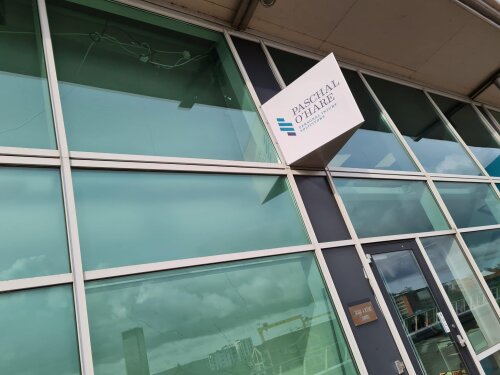Best Insurance Lawyers in Belfast
Share your needs with us, get contacted by law firms.
Free. Takes 2 min.
List of the best lawyers in Belfast, United Kingdom
About Insurance Law in Belfast, United Kingdom
Insurance law in Belfast sits within the legal framework of Northern Ireland and the wider United Kingdom. It covers the formation, interpretation and enforcement of insurance contracts, regulation of insurers and intermediaries, and the resolution of disputes between policyholders and insurers. Both consumer and commercial insurance are governed by UK-wide statutes and regulatory rules, together with local civil procedure and courts in Northern Ireland. Key types of insurance covered by the law include motor, household, employers liability, professional indemnity, business interruption and specialist commercial covers.
Why You May Need a Lawyer
Insurance disputes can be complex and require legal help in several common situations, including:
- A claim is denied or only partly paid and you believe the insurer is wrong to refuse or reduce the settlement.
- There is a disagreement about whether an event is covered under the policy wording or exclusions.
- You face an insurer claiming you misled them, seeking to avoid or void the policy.
- Complex liability issues arise after a motor accident, workplace injury or third-party claim where insurers and other parties dispute responsibility.
- Large commercial claims, for example business interruption, professional indemnity or cyber losses, where policy interpretation, aggregation and indemnity limits are disputed.
- Subrogation, contribution or recovery actions where the insurer pursues a third party, or you are asked to contribute to a recovery.
- Fraud allegations, criminal investigations or regulatory enquiries involving an insurer or policyholder.
- Assistance with policy drafting, placing cover for a business, or negotiating indemnity arrangements and reinsurance structures.
Local Laws Overview
Key legal and regulatory points to bear in mind when dealing with insurance matters in Belfast include:
- Statutes affecting insurance - Consumer and commercial insurance matters are shaped by UK legislation such as the Insurance Act 2015 for commercial contracts and the Consumer Insurance (Disclosure and Representations) Act 2012 for consumer contracts. Consumer rights and unfair contract terms are also influenced by the Consumer Rights Act.
- Regulation - Insurers, brokers and intermediaries operating in Northern Ireland are regulated by UK regulators. Firms selling insurance are subject to conduct and complaints rules designed to protect consumers and small businesses.
- Complaint handling and dispute resolution - Insurers must operate internal complaint procedures. If an internal complaint remains unresolved, the Financial Ombudsman Service handles many disputes between consumers and regulated firms.
- Courts and remedies - Civil claims are brought in the courts of Northern Ireland. Lower-value disputes may use local small claims procedures, while larger or more complex matters go to County Courts or the High Court. Remedies can include payment of claims, declarations about coverage, damages for breach of contract or bad faith, and costs awards.
- Limitation periods - Time limits apply to bringing claims. Contract and tort claims are subject to statutory limitation rules, and some claims such as personal injury have shorter limitation periods. It is important to act promptly to preserve rights.
- Statutory insurance obligations - Certain covers are compulsory for particular activities - for example motor insurance for drivers and employers liability insurance for most businesses with staff. Failure to hold required insurance can have legal and financial consequences.
- Fraud and criminal law - Insurance fraud can lead to civil and criminal consequences. Insurers, the police and regulatory bodies investigate suspected fraud.
Frequently Asked Questions
What should I do first if my insurance claim is denied?
Start by carefully reading the insurer's denial letter and your policy wording. Collect and preserve all evidence - photos, receipts, correspondence and any third-party reports. Ask the insurer to explain the specific reason for denial in writing. If you still dispute the decision, follow the insurer's complaints procedure and consider seeking legal advice early to understand your options and time limits.
Can I challenge an insurer that says I did not disclose something on my application?
Yes. Whether a failure to disclose affects your cover depends on the type of insurance and the significance of the non-disclosure. Consumer and commercial rules differ. For consumer policies, there are specific statutory protections. A lawyer can review the facts, the questions asked on the application, and advise on whether the insurer is entitled to avoid the policy or reduce the claim.
How long do I have to bring an insurance-related claim?
Limitation periods depend on the type of claim. Contract and most tort claims are typically subject to statutory time limits. Personal injury claims usually have shorter limitation periods. These deadlines can be strict, so you should seek advice promptly if you believe you have a claim.
Should I complain to the insurer first or go straight to the Financial Ombudsman Service?
You should use the insurer's internal complaints procedure first. Most Ombudsman rules require that you obtain the insurer's final response before referring the matter. If the insurer does not resolve your complaint, or you remain dissatisfied after their final response, you can refer the dispute to the Financial Ombudsman Service if it is a regulated matter.
Are there court-free ways to resolve insurance disputes?
Yes. Many disputes are resolved through negotiation, mediation or arbitration. The Financial Ombudsman Service offers a free dispute resolution service for many consumer cases. For commercial disputes, parties commonly use mediation or arbitration clauses to avoid court litigation. A lawyer can help assess which route best fits your situation.
What evidence will help my insurance claim succeed?
Useful evidence includes the insurance policy and schedule, correspondence with the insurer, photographs or video of damage, repair or diagnostic reports, receipts for repaired or replaced items, witness statements, police reports where relevant, medical reports for personal injury, and any expert reports supporting the cause and extent of loss.
Do I need a solicitor for a motor insurance claim after an accident?
Not every motor claim requires a solicitor, but you may need one if liability is disputed, injuries are serious, multiple parties are involved, or the insurer is acting unreasonably. A solicitor can help with documenting damages, negotiating settlements and, if necessary, bringing or defending court proceedings.
Can a solicitor help with commercial insurance disputes for my business?
Yes. Commercial insurance disputes can involve complex policy interpretation, aggregation of losses, business interruption measurement, and interactions with other contracts. A solicitor experienced in insurance law can advise on coverage, manage large claims, handle negotiations with insurers, and pursue litigation or alternative dispute resolution where required.
How are insurer complaints handled and how long do they take?
Insurers must investigate complaints and provide clear written responses. Timeframes can vary depending on the complexity of the complaint. Regulators require timely responses and specify when a matter can be taken to an independent body if the customer remains unhappy. If a complaint is not resolved, a referral to the Financial Ombudsman Service or an appropriate alternative dispute resolution provider is often the next step.
What are the likely costs of pursuing an insurance dispute?
Costs depend on the dispute size and route chosen. Options may include fixed-fee advice, hourly rates, conditional-fee agreements or insurance-funded litigation in some circumstances. For consumer disputes, using the Financial Ombudsman Service is free. Always ask a solicitor for a clear costs estimate and about options for cost protection, such as after-the-event insurance or funding arrangements where appropriate.
Additional Resources
Useful bodies and organizations to contact or consult if you need information or assistance include:
- The Financial Ombudsman Service - an independent service for resolving consumer disputes with regulated financial firms.
- The Financial Conduct Authority and Prudential Regulation Authority - the UK regulators for insurers and intermediaries.
- Law Society of Northern Ireland - for finding regulated solicitors who practise insurance law and for guidance on solicitor standards.
- Consumer Council for Northern Ireland and Citizens Advice Northern Ireland - for advice on consumer rights and complaint handling.
- Motor Insurers' Bureau and Insurance industry trade bodies - for matters involving uninsured drivers or industry guidance.
- Northern Ireland Courts and Tribunals Service - for information on how and where to bring court proceedings locally.
- Police Service of Northern Ireland and insurance fraud bureaux - for reporting suspected insurance fraud and obtaining relevant criminal investigation support.
- Information Commissioner’s Office - for issues involving personal data held by insurers.
Next Steps
If you need legal assistance with an insurance matter in Belfast, consider the following practical steps:
- Preserve all documents and evidence related to the loss or dispute - policy documents, correspondence, photos, invoices and any reports.
- Read your policy schedule and wording carefully to identify cover, deductibles and exclusions.
- Contact your insurer promptly and follow their claims and complaints procedures. Keep records of all communications.
- Seek an initial legal consultation with a solicitor experienced in insurance law to assess merit, likely remedies and costs. Use the Law Society of Northern Ireland to find and verify solicitors.
- Consider alternative dispute resolution options such as mediation or the Financial Ombudsman Service for consumer disputes.
- Be mindful of limitation periods and act quickly to protect your legal rights.
- Ask your solicitor about funding options and the likely timetable and outcomes, so you can make an informed decision about next steps.
If you are unsure where to start, a short advice meeting with a solicitor or an adviser at Citizens Advice or the Consumer Council for Northern Ireland can clarify your position and help you decide whether you should escalate the matter or pursue formal legal action.
Lawzana helps you find the best lawyers and law firms in Belfast through a curated and pre-screened list of qualified legal professionals. Our platform offers rankings and detailed profiles of attorneys and law firms, allowing you to compare based on practice areas, including Insurance, experience, and client feedback.
Each profile includes a description of the firm's areas of practice, client reviews, team members and partners, year of establishment, spoken languages, office locations, contact information, social media presence, and any published articles or resources. Most firms on our platform speak English and are experienced in both local and international legal matters.
Get a quote from top-rated law firms in Belfast, United Kingdom — quickly, securely, and without unnecessary hassle.
Disclaimer:
The information provided on this page is for general informational purposes only and does not constitute legal advice. While we strive to ensure the accuracy and relevance of the content, legal information may change over time, and interpretations of the law can vary. You should always consult with a qualified legal professional for advice specific to your situation.
We disclaim all liability for actions taken or not taken based on the content of this page. If you believe any information is incorrect or outdated, please contact us, and we will review and update it where appropriate.
Browse insurance law firms by service in Belfast, United Kingdom
Belfast, United Kingdom Attorneys in related practice areas.









